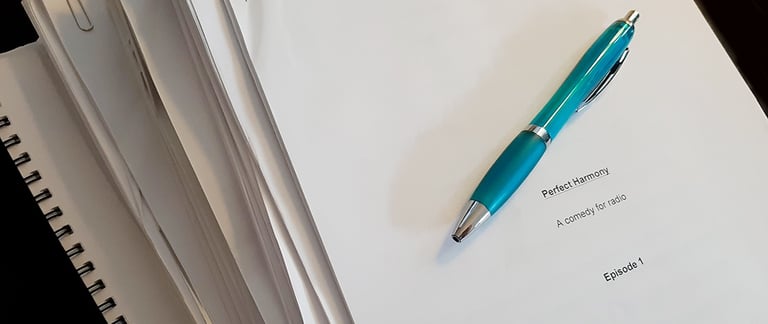I’ve been script reading for one of the big international competitions recently and, having been through the openings of hundreds of submissions, I thought I’d share my thoughts.
So here are some broad reflections on the process that might be of use for comedy writers everywhere.
Characterisation
It’s amazing how many otherwise gifted writers introduce characters by describing the colour of their hair or some other superficial detail. Being ‘blonde’ tells us nothing about your creation and besides, actors are generally cast on their ability, nothing else. Try describing your protagonist in three adjectives instead (e.g. lethargic, pessimistic, secretive) or with a single arresting phrase (“an older man lost in the modern world”). There’s no point telling us anything about a character we won’t grasp from what you’ve put onscreen either – it all has to be up there for an audience.
Grab Our Attention
The first sift of scripts involved reading the logline, short plot synopsis (one paragraph) and initial two pages. Any writers who hadn’t worked up their supporting material (or, in some cases, bothered to provide any at all) were at an immediate disadvantage, as were those whose scripts took a while to get going. Have vital plot points happening early if you can. Similarly, it’s no good leaving it 8-10 pages to introduce your protagonist.
Narrative
Whether in comedy or elsewhere, a good approach, I think, is to create interesting, three-dimensional characters, give these characters problems and make those problems big. There’s nothing wrong with a more low-key piece, but if very little happens in your script you’ll have to work much harder to sustain our attention. The big thing for production companies right now is ‘returnability’; multiple series mapped out in advance, beyond the first six episodes. It’s difficult to convey you’re good at this without thrashing out multi-episode narrative arcs in advance.
Originality
The Holy Grail right now and the first aspect we rated on; quickly followed by a separate but equally weighted score for the premise (how fresh and involving the idea felt). If your work is a little rough and ready but a brilliant concept, the industry is more likely to be open to it, because minor flaws can be easily fixed. But however effective or polished your script, if it feels derivative or has been done many times before, it’s likely to get overlooked.
Visual Storytelling
Less important for comedy than other genres but still; this was a screenplay competition, not an audio one; yet I still read openings more suited to radio or a podcast. If you’ve written an audio comedy script that’s great (in fact, we’re looking for more audio sketches at LCW right now, so get cracking). But characters sitting around talking through extended scenes that don’t go anywhere isn’t particularly dynamic in terms of visual entertainment. Remember to exploit the opportunities (and maybe even utilise the limitations) of that medium you’re working in.
Quality
A high proportion of scripts I sifted were comedic because, after reading 125+ sitcoms at LCW since 2016, I’m more confident assessing comedy than say, fantasy or ‘faith’. Broadly, the standard was similar to that which we see at London Comedy Writers, week in, week out; if more polished (it’s sensible to bring an earlier draft to a table read/critique). Very few sitcoms or comic features were so enthralling I felt compelled to go on reading, but those that drew me in really stood out. There’s a huge market for comedy these days, what with streaming services and YouTube channels adding to traditional outlets, so there’s room for more writers than ever. Keep at it.
Overall, as recent successes for LCW regulars shows, there’s no real secret to getting there, beyond sheer hard work. Learn early how to take the kind of notes you’ll eventually get from people in the industry then use that feedback to refine and improve your work wherever possible. Because a script should be the best it can be before being formal submission to anyone, or paying your entry fee. This is where LCW can help, of course.


